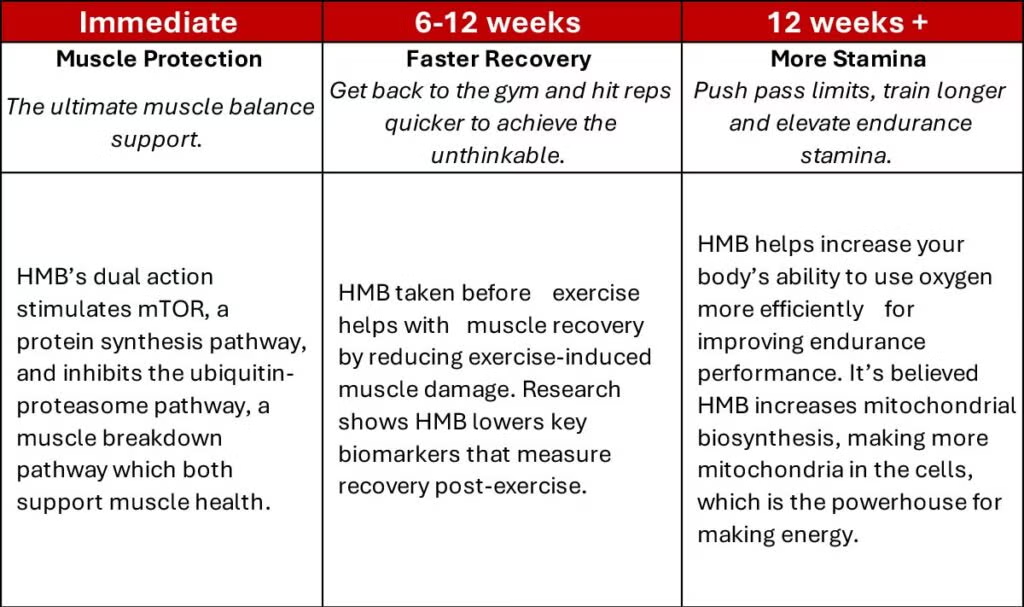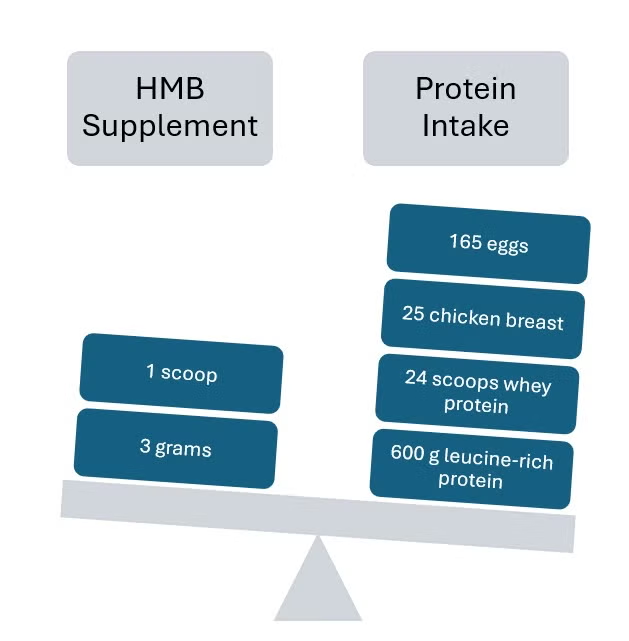
GNC is always on a mission to find the most innovative ingredients to help you Live Well, but some tried-and-true basics are just too good to ignore, even if they seem boring. These ingredients are almost forgotten about because of trendy new ingredients flooding social media. Luckily, our team of scientists and nutrition nerds are always ready to remind you of these forgotten gems. I recently did a deep dive into one of these tried-and-true ingredients as we scoured our toolbox of ingredients to make new formulas. I was so surprised by the amount of scientific evidence; our team wanted you to know too!
Say hello to HMB, a 3-letter abbreviation for a VERY long chemistry name, beta-Hydroxy beta–Methylbutyrate. Don’t get scared, this little molecule is pretty awesome and I’m here to break down the science and convince you how we benefit from this somewhat stale ingredient. It’s anything but boring! An oldie but a goodie!
KEY BENEFITS OF HMB
- HMB supplements are needed since we can’t get adequate levels from dietary intake
- HMB has a unique dual action that stimulates protein synthesis pathways and inhibits muscle breakdown pathways
- HMB helps improve endurance performance by improving your ability to use oxygen during exercise and pushing your cardio limits higher
- Taking HMB before a workout may protect muscles from exercise-induced damage, helping with recovery
- HMB helps older adults preserve lean mass when combined with adequate protein intake
- HMB can help support muscle health for individuals on a weight loss journey
WHAT IS A HMB SUPPLEMENT?
HMB was first discovered in the 90s by Dr. Naji Abumrad and Dr. Steven Nissen. Through their initial research they discovered a metabolite of leucine which activates protein pathways, known as HMB. HMB is a metabolite (a byproduct) produced from the essential amino acid leucine. Leucine is an important branched-chain amino acid well known as the primary signaling amino acid for activating protein synthesis. All this sounds really complicated but what you need to know is HMB signals the body in a variety of different ways. These signals act like a light switch by turning on and off different pathways. It’s the most unique because it has dual actions which stimulate protein synthesis pathways (making protein) and inhibit muscle degradation pathways (muscle breakdown) [1,2].
In comparison, leucine only turns on the protein synthesis pathways and does not turn off muscle breakdown pathways. That’s why the discovery of HMB was so novel. Why is this important? Our body has this process called protein turnover. Essentially everyday proteins within the body get broken down and make more proteins in the body, whether it’s muscle, hormones, or enzymes. If you are breaking down more protein in the body, through working out a lot, stress, low calorie dieting, or natural age-related muscle loss, you need to eat more protein in your diet to keep this protein turnover in balance. For example, an athlete breaks down a lot of protein in their body from physical training, therefore they need to eat more protein to replace and repair the muscle tissue.
As we age, natural physiological changes make muscle loss happen at a more rapid pace than when we are younger, so older adults need more protein than someone in their 20s. Keeping the protein turnover in balance helps to preserve muscle mass. Muscle mass is so vital for health as muscle helps our bodies maintain posture, mobility, balance, flexibility, blood sugar control, and metabolic rates. The pathways of protein breakdown or protein synthesis are turned on or off based on lifestyle and dietary intake, but HMB is known for helping turn on the positive and turn off the negative pathways to support health.
SOURCES OF HMB
As mentioned before, HMB is a byproduct of breaking down leucine from our protein-rich foods. However, only about 5% is converted and most of us are unable to obtain the beneficial level of HMB from diet alone. In fact, to get the equivalence of the typical 3-gram dose of HMB in clinical studies, you’d need to eat 60 grams of leucine which would be about 600 grams of protein [3]! Are you kidding me! That would be like eating 25 chicken breasts, or 24 scoops (1 scoop = 25 grams) of whey protein per day! Not feasible or realistic for anyone. So dietary supplementation is the best way to get the benefits of HMB.
HMB supplements have two forms: 1) free acid and 2) calcium bound. The HMB-free acid is quickly absorbed but is very bitter and only comes in a liquid form. HMB- Calcium bound has a calcium molecule (that bone building mineral!) attached to the HMB molecule which helps it be less bitter and can be put in a pill or powder format. HMB-Calcium is also a lot more affordable. Because of the taste and cost, HMB-calcium has been studied more in clinical research than HMB-free acid.
THE SCIENCE OF HMB
Over the past few decades, HMB has garnered attention within the bro-science community for its potential to enhance muscle mass, strength, and recovery, making it a popular supplement among gym goers and bodybuilders. More recently with research focusing on muscle health, HMB is finding its way back to its grassroots of that light switch for muscle health, especially for people who might experience greater levels of muscle loss, such as aging or massive weight loss. With HMB interests piquing, I wanted to critically analyze the available evidence on HMB, its potential benefits, and provide an authoritative stance as a dietitian with a PhD to help consumers Live Well.
I found way more than expected. Let’s dive into the HMB supplement benefits…
HMB SUPPLEMENT BENEFITS
Body Composition, Muscle Mass and Strength in Younger Adults
Remember the original excitement around HMB popularity for its potential to enhance muscle mass and strength and a classic HMB bodybuilding supplement? Several clinical studies have been conducted in a wide range of people from younger untrained individuals to elite level athletes [4, 5, 6]. From this research, we see untrained individuals benefited from improving lower body strength with HMB supplementation but not much improvement for trained individuals. We can draw conclusions that the elite level athletes are most likely already at their peak level, making it challenging to elicit more improvements.
One challenge that made it hard to provide a direct link between HMB supplementation and improvements of muscle mass and strength was the limit of progressive, structured exercise programs. Most of these studies were during training for the sport or were not monitored at all. To gain muscle mass and strength, you need progressive overload to build more muscle. Without that, HMB won’t be able to make a significant impact in the short term. These studies were also relatively short, lasting less than 12-weeks, and it might take longer for HMB supplementation to improve body composition, muscle mass, and muscle strength in this population.
HMB supplementation appears to enhance these adaptations in untrained individuals or during unfamiliar, high-intensity training. Since adaptation rates are slower in trained individuals, HMB’s effects likely require longer durations than 12 weeks for muscle strength benefits. There is strong research showing performance benefits using HMB beyond strength for athletes of all levels though!
HMB & Endurance
Endurance performance is where I was surprised the most by the research. In the supplement world, no one really talks about HMB improving endurance performance as most tout the benefits for muscle health and strength. I was shocked at the amount of research on endurance performance across all levels of athletes. Endurance performance in clinical research is measured with validated assessments, such as time to exhaustion and VO2max (how hard we are breathing, which is a measure of how your body uses oxygen during exercise). It can also be measured with an anaerobic threshold, essentially asking how long someone can push beyond their capacity to keep high intensity before fatigue.
Two meta-analyses (research and stats experts analyzing multiple clinical trials) found HMB supplements improve aerobic capacity by increasing VO2max [7, 8]. They also found a statistically significant improvement in time to exhaustion and ventilary threshold, which measures how long you can sustain exercise before fatigue sets in due to lactic acid. Lactic acid is what gives you that burning feeling in your muscles. So HMB helps increase your body’s ability to use oxygen more efficiently and improves endurance performance. HMB can be a great compliment to any athlete’s regime to support endurance performance.
HMB & Muscle Damage: Helps Support Recovery
Ok, I will try to keep this one simple and straightforward. When we exercise, damage to our muscles occurs and we can measure this with biomarkers in the blood. We want to see how quickly we can help get those biomarkers back down to normal after a workout because that shows us your muscles are recovered and ready to work out again. There have been several studies in both trained and untrained individuals with HMB improving these biomarkers [9, 10]. HMB lowered key biomarkers for muscle damage significantly more than the placebo groups. More positive results are seen in untrained individuals for this benefit, but trained individuals see the benefit too if their exercise is higher intensity than their normal routine. Simply stated, HMB can help you recover from intense exercise through lowering muscle damage.

Older Adults & HMB
Older adults experience a decline in muscle mass and strength, leading to frailty, reduced physical function, and an increased risk of falls and hospitalization. HMB supplementation has been investigated as a strategy to help mitigate these issues by potentially preserving muscle mass and muscle function. Research in older adults most often combines HMB with protein and other ingredients into a nutrition shake as the intervention. This does not allow us to directly link HMB to the outcomes since more than HMB was introduced and studied. However, some of the findings show improvements in lean mass in older adults lets us know for this population, not only HMB supplementation but a protein supplement is important to support muscle health too [11].
The older adults who appeared to benefit the most in these clinical trials were recovering in the hospital, bedridden, or sedentary. This makes sense, since as we age, we lose muscle mass more rapidly than when we were younger. If you think about the protein turnover balance, older adults are in a negative balance for muscle protein breakdown, so they need the extra protein to help balance that scale. A lot of these studies did not include an exercise intervention either, so image what a protein + HMB supplement and resistance training could do for your grandma! No deadlifts in the intervention, even though that is a life goal of mine, to deadlift until the day I die.
For older adults, especially less active ones, HMB supplementation along with adequate protein intake seems to help preserve muscle mass but there certainly needs to be added resistance training too!
Weight Loss
During weight loss, caloric restriction can reduce the signals that normally promote muscle growth, increasing the risk of muscle breakdown. During weight loss, we naturally will lose lean mass, which includes muscle, but we need to ask ourselves the degree of muscle loss. For example, individuals taking GLP-1 medication lose around 20-50% lean body mass [12].
Our GLP-1 support wall features HMB for this reason. HMB has dual action to help support protein balance in the body. Only a few studies looked at HMB for weight loss in a group of older men and trained female athletes [13, 14 ]. In older men, the group who took HMB plus resistance training reduced abdominal fat. This is clinically meaningful since abdominal fat is a predictor for cardiovascular health. In the female athletes, there weren’t many significant findings related to weight loss. The biggest limitation with the study design was combination with intermittent fasting and one study was only 3-days long.
Given the rise of weight loss medications, we need research on HMB supplementation for healthier weight loss outcomes. However, the mechanism of HMB helping turn on and off the protein pathways is important for muscle support during weight loss.
Whoa, that’s a lot of research but really cool stuff happening with HMB! Here are some practical ways you can incorporate HMB in your routine from dosing and fun tips since some HMB supplements can taste bitter.
WHO CAN BENEFIT FROM HMB?
- Athletes, gym goers, and active fitness of all levels
- People on a weight loss journey
- Older adults, especially when combined with a protein supplement
- Anyone with inadequate daily protein intake
HOW TO TAKE HMB SUPPLEMENTS
HMB has been clinically studied from 1.5 grams to 6 grams per day with most of the research using 3 grams. How to take HMB supplements depends on if you choose a pill format or a powder format and there’s no one best HMB supplement, but I prefer the powder! Now the question about when is the best time to take an HMB supplement, it’s about 30-60 minutes before a workout for recovery or just consistently day to day for HMB supplement benefits.

Get the power of 3 grams of HMB—without the need to consume 600 grams of high-quality protein (or 60 grams of leucine)!

DIETITIAN TIPS FOR TAKING YOUR HMB SUPPLEMENT
I’ll be honest, taking supplements can get boring, so I played around with different ways on how to take your HMB if you’re tired of pills.
HMB powder usually has a bitter off-putting flavor but adding it into a citrus or fruity flavored drink or supplement can help take that bitterness away. My favorite way to take my HMB is the Chem Labs HMB mixed in Icy lemonade Amplified Greens. I also add a scoop of creatine to get some clinically proven muscle strength increase benefits for my resistance training!
Also try adding HMB to your pre-workout to get the benefits of improving your endurance! Confession, I don’t like pre-workout, but our team talked about this being a great addition to pre-workout benefits, and I agree! Maybe I will give it a try sometime.
I hope you are just as surprised as I was about the science behind HMB. We could all benefit from HMB’s unique dual action. Whether you are a weekend warrior, trying to lose weight, or wanting to age healthier, data shows HMB can help provide several benefits. And for my athletes, or fitness lovers, HMB can help with endurance and recovery.
I think HMB might be GNC’s best kept secret…. But secrets don’t make friends!
Check Out Customer HMB Supplement Reviews Here.
Resources
- Holeček M. Beta-hydroxy-beta-methylbutyrate supplementation and skeletal muscle in healthy and muscle-wasting conditions. J Cachexia Sarcopenia Muscle. 2017 Aug;8(4):529-541. doi: 10.1002/jcsm.12208. Epub 2017 May 10. PMID: 28493406; PMCID: PMC5566641.
- Kaczka P, Michalczyk MM, Jastrząb R, Gawelczyk M, Kubicka K. Mechanism of Action and the Effect of Beta-Hydroxy-Beta-Methylbutyrate (HMB) Supplementation on Different Types of Physical Performance – A Systematic Review. J Hum Kinet. 2019 Aug 21;68:211-222. doi: 10.2478/hukin-2019-0070. PMID: 31531146; PMCID: PMC6724588.
- 3 grams of HMB, an individual would need to consume over 600 grams of high-quality protein (equivalent to 60 grams of leucine). ISSN: Full article: International Society of Sports Nutrition Position Stand: beta-hydroxy-beta-methylbutyrate (HMB)
- Rowlands DS, Thomson JS. Effects of beta-hydroxy-beta-methylbutyrate supplementation during resistance training on strength, body composition, and muscle damage in trained and untrained young men: a meta-analysis. J Strength Cond Res. 2009 May;23(3):836-46. doi: 10.1519/JSC.0b013e3181a00c80. PMID: 19387395.
- Sanchez-Martinez J, Santos-Lozano A, Garcia-Hermoso A, Sadarangani KP, Cristi-Montero C. Effects of beta-hydroxy-beta-methylbutyrate supplementation on strength and body composition in trained and competitive athletes: A meta-analysis of randomized controlled trials. J Sci Med Sport. 2018 Jul;21(7):727-735. doi: 10.1016/j.jsams.2017.11.003. Epub 2017 Nov 10. PMID: 29249685.
- Jakubowski JS, Nunes EA, Teixeira FJ, Vescio V, Morton RW, Banfield L, Phillips SM. Supplementation with the Leucine Metabolite β-hydroxy-β-methylbutyrate (HMB) does not Improve Resistance Exercise-Induced Changes in Body Composition or Strength in Young Subjects: A Systematic Review and Meta-Analysis. Nutrients. 2020 May 23;12(5):1523. doi: 10.3390/nu12051523. PMID: 32456217; PMCID: PMC7285233.
- Fernández-Landa J, Todorovic N, Santibañez-Gutierrez A, Ostojic SM, Calleja-González J, Sekulic D, Mielgo-Ayuso J. Effects of HMB on Endurance Performance in a Healthy Population: A Systematic Review and Meta-Analysis. J Strength Cond Res. 2024 Apr 1;38(4):e202-e210. doi: 10.1519/JSC.0000000000004690. Epub 2023 Dec 13. PMID: 38090973.
- Kahraman, Y., & Ertören, H. (2022). Active Status of HMB Supplementation on Aerobic Capacity, Blood Parameters, Low and High Intense Body Muscle Oxygen and Energy Ergometer: A Systematic Review and Fixed Model Effect Meta-Analysis. Uluslararası Bozok Spor Bilimleri Dergisi, 3(3), 97-107.
- Rahimi, M. H., Mohammadi, H., Eshaghi, H., Askari, G., & Miraghajani, M. (2018). The Effects of Beta-Hydroxy-Beta-Methylbutyrate supplementation on Recovery Following Exercise-Induced Muscle Damage: A Systematic Review and Meta-Analysis. Journal of the American College of Nutrition, 37(7), 640–649. https://doi.org/10.1080/07315724.2018.1451789
- Rowlands DS, Thomson JS. Effects of beta-hydroxy-beta-methylbutyrate supplementation during resistance training on strength, body composition, and muscle damage in trained and untrained young men: a meta-analysis. J Strength Cond Res. 2009 May;23(3):836-46. doi: 10.1519/JSC.0b013e3181a00c80. PMID: 19387395.









